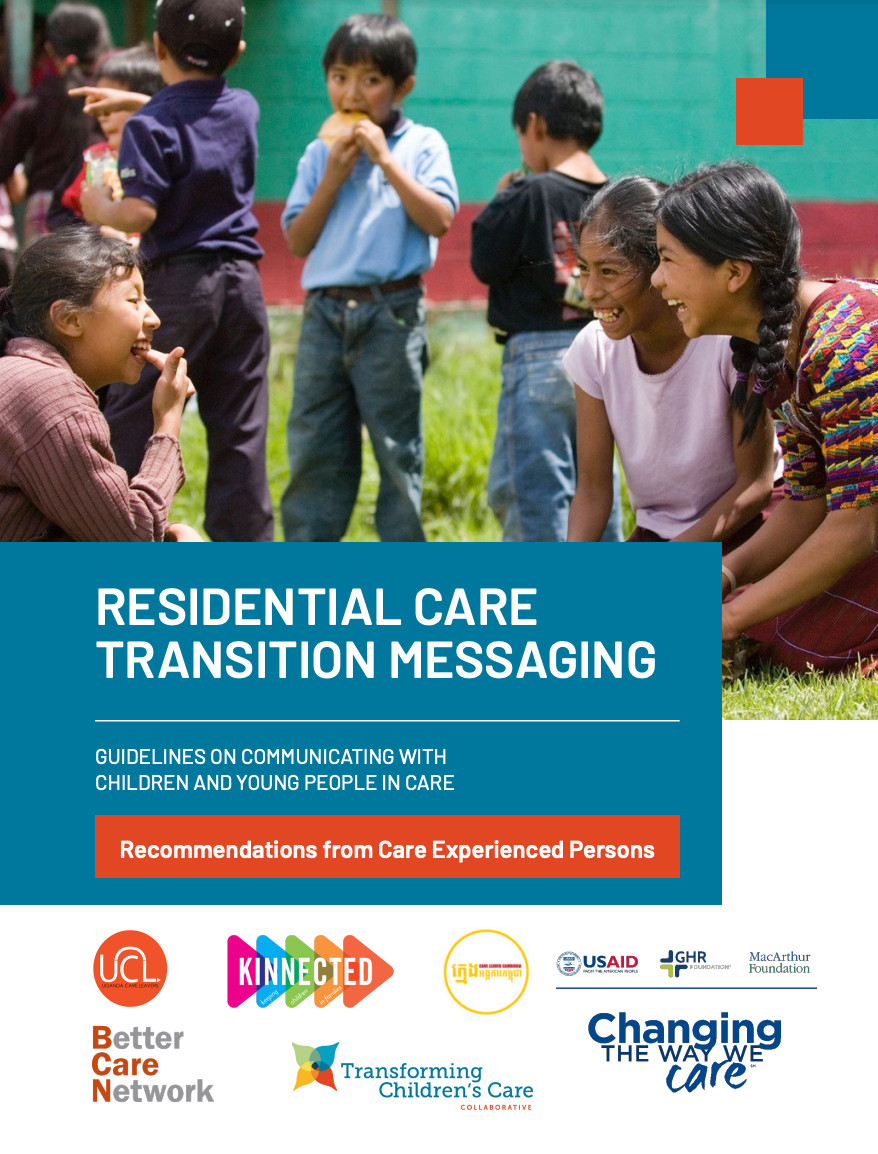This month at Martin James Foundation, we are taking a particular look at participation: a term used to describe the centrality of listening to people with lived experience.
But what is participation? Is it merely another tick box? Or is there a way to engage meaningfully and respectfully with those who have lived experience of alternative care?
Participation within our sector can be best understood to have two central dimensions: first, a child having the right to give meaningful feedback and input into their own care and second, including the perspectives of people with lived experience as society works to build policies, systems and structures to serve children in alternative care. Both dimensions stress the same central message: the person experiencing care is an expert in their own care and beyond. Their perspective and leadership ought to be prioritised at every possible level. This month, we are paying particular attention to how we, as people and organisations who care about how children are served, listen to the very children we are working to reach.
For a child’s personal situation, participation means that a child has the right to give input into their care in an age-appropriate manner. It means asking children if they are satisfied with how their care is being handled. To truly achieve this requires an immense amount of resolve and courage.
Imagine being a child’s social worker. A child in the alternative care system is likely to have had multiple case workers over their childhood. While some of this is not preventable, imagine what this feels like to a child. What kinds of questions might you have if you were a child in foster care?

Think about answering the same questions repeatedly. What might it be like to share the most terrifying details of your life with a new adult regularly?
Participation, at its most fundamental level, means that at some point, an adult stops to look directly at the child to say, “How are we doing?“
Are we meeting your needs?
What would you like us to do differently?
Have you already shared this story elsewhere and would rather not share the details again?
We must regularly ask for feedback from the children we are serving, and be ready to hear what needs to be adjusted. It means that professionals within the care space must be prepared to learn from the very children they are serving. We must take deliberate, decisive action based on their feedback to ensure we improve our manner of care.
People with lived experience of care are indeed the experts in their lives and throughout the care reform sector. They may not yet have fancy titles or additional letters to add past their name, but of anyone we know, they have the most important perspective to offer. It’s why we believe we should prioritise asking them for input on the whole system, as well as their own care. It means ensuring people with lived experience a prominent seat at the table while we work to develop services and policies for children, youth and those with care experience. It must be genuine, demonstrated by a willingness to take the time to ensure their participation and perspective are integrated at every decision-making level. Every policy and service will be better for being informed by people with lived experience.
That’s why participation, authentic and genuine participation, is embedded into each of our projects with our valued global partners. Read on to hear how several of them prioritise participation within their programs today.

Global Social Service Workforce Alliance & Child Frontiers
“Five Reasons the Expertise of Children and Young People with Lived Experience of Care Must Take Centre Stage in Care Reform Efforts”
By Hugh Salmon, Director, Global Social Service Workforce Alliance and Emily Delap, Senior Associate, Child Frontiers
As countries work to achieve lasting family-based care solutions, children and young people with lived experience of care possess invaluable insights and wisdom. Yet, too often, their perspectives are sidelined or overlooked. The Global Social Service Workforce Alliance, Child Frontiers and Martin James Foundation are currently implementing a multi-national project that aims to improve the capacity of the social service workforce to respond to children at risk of family separation by learning directly from those with lived experience of care.
There are five reasons, in particular, why we consider it imperative that the voices and expertise of children and young people with lived experience of care take centre stage in efforts to strengthen the social service workforce in support of care reform:
- Ensuring social services and work practice are grounded in reality: Children and young people who have experienced the care system firsthand possess a unique understanding of its intricacies, challenges, and shortcomings. Sharing these experiences can help identify gaps in services, barriers to access, and areas of social work practice that need improvement. These insights can ensure that the ways we strengthen the social service workforce are rooted in the lived realities of those the workforce aims to serve.
- Empowerment: By engaging young people with experience in care, we can help foster a sense of belonging and purpose. By providing opportunities for meaningful participation, we also empower young people to become agents of change in improving social work practice in supporting children and families.
- Informing training and development: Incorporating the insights and expertise of children and young people in care into the training and development of social service workers can greatly enrich the learning experience and provide practical resources for the workers. By sharing their positive and negative experiences, young people can also help shape more effective approaches to service delivery.
- Advocacy and Policy Influence: The voices of children and young people with lived experience of care can be powerful catalysts for policy change. By following their lead in our advocacy campaigns, we can elevate issues that are otherwise all too often overlooked.
- Driving Systemic Change: Ultimately, incorporating the expertise of children and young people with lived experience of care is not just about improving the quality of services and working practices—it’s about driving overall systemic change and moving closer to a world in which every child and family can benefit from lasting family-based care solutions.
Click here to learn more about the Strengthening the Social Service Workforce for Family-Based Care project.
Udayan Care
Udayan Care has been serving vulnerable children and families throughout India since 1994. From directly providing alternative care to children separated from their families, to working in family strengthening, to providing a place to belong for care-leavers, Udayan Care is often at the forefront of innovation within their communities.
The team at Udayan Care believes deeply in the efficacy of participatory methodologies. This qualitative approach to decision-making and program design prioritises hearing feedback directly from those a project or program seeks to serve.
As they continued developing their programming, they created a Questionnaire to Assess the Fulfilment of Needs of Children in Care (QANCC). They found that such a tool was needed that allowed children to directly provide feedback on the care they were receiving, specifically within similar child-care institution settings in India, so Udayan Care developed one!
The QANCC allows children to share their experience across four areas of needs: basic/fundamental, emotional, educational, and interpersonal. This allows children to be more than passive beneficiaries of services provided and instead ensures their leadership and influence are prioritised. As the team reviews this feedback year after year, they can identify the growth areas that matter most to the children served. By asking them directly, children can assess themselves if their rights are being upheld. This feedback has led to Udayan Care implementing changes to their programming in response to children’s perspectives.

Beyond this, Udayan Care has worked to incorporate the perspective and leadership of those who experienced care within their programs. By implementing their feedback and ideas, children served have been empowered to voice their opinions and advocate for their needs. This input has significantly influenced the operation and management of Udayan Care. Further, several youth with care experience are now employed within Udayan Care’s programs, providing crucial insight and leadership.

New Guidance on Transition – Produced by People with Lived Experience
Finally, this month, we are celebrating with several of MJF’s partners who collaborated on a new tool, Residential Care Transition Messaging. Leaders, including those with lived experience, from Child’s i Foundation, Forget Me Not, and Better Care Network worked to shape this powerful guide on approaching the transition of residential care models from the perspective of children who spent time in alternative care.
This guide serves to remind those within care reform of the importance of clear communication with children and young people while a residential care home is being transitioned, noting that “although children and young people are the individuals whose lives are most impacted by transition, they are often rendered bystanders to a process imposed upon them. They may be left to wonder what is happening to them, with little agency to exercise their right to meaningful participation.”
The guide is crucial for all practitioners involved in any care reform efforts, as it was developed by those who experienced alternative care directly. It contains powerful testimonies from children who were often left with questions. Researchers noted children were concerned about whether their education support would continue or were confused as to why their “home” was being closed in the first place. The report also highlights the risk of offering disingenuous participation offers, with some children feeling as though their concerns and questions should have been addressed throughout the transition process. To address these concerns, the guide recommends that leaders “clarify the areas in which children and young people will be allowed to make decisions versus the areas in which they will have no choice at all, and the areas in between. Consider not only the developmental age of children and young people but also be mindful of resource limitations.”
The report concludes with this powerful advice, “Be kind to care leavers. They have been through a lot at a young age.”
All of us at Martin James Foundation are deeply grateful for the leaders and partners with care experience from whom we learn daily. We are thankful to follow their lead and share their hope that one day, every child will grow up in a safe and loving family.



